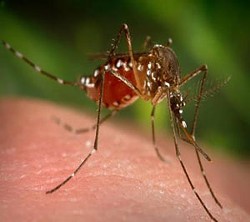News Blog

- National Park Service
The resident was asymptomatic and the virus was detected during a routine blood donation screening, according to a press release. West Nile — which can cause fever, headaches, fatigue, muscle pain, vomiting and, rarely in extreme cases, neurological disease — is transmitted by mosquitoes, which contract it by feeding on infected birds.
“The likelihood of contracting WNV here is low, but people who travel certainly can bring it home,” said Humboldt County Health Officer Donald Baird in the press release.
For more information, see the county’s full press release copied below.
West Nile Virus detected in Humboldt County
Local health officials have announced the first confirmed human West Nile Virus (WNV) infection in Humboldt County in four years. The virus was detected during a routine blood donation from an asymptomatic resident following travel to another country, where it is believed the virus was contracted. To prevent transfusion-related infection, all blood donations are routinely screened for WNV and any infected blood is discarded.
Humboldt County Public Health officials say the local risk is limited because the virus is transmitted by mosquitoes, not humans. Mosquitoes become infected when they feed on infected birds. Infected mosquitoes can spread the virus to other animals and humans.
“The likelihood of contracting WNV here is low, but people who travel certainly can bring it home,” said Humboldt County Health Officer Dr. Donald Baird. Humboldt County last had a human WNV infection in 2013, also following a resident’s foreign travel.
As of Aug. 18, 2017, WNV has been detected in nine of California’s 58 counties, with 41 human cases statewide.
Local residents are advised to follow standard safety measures, especially when traveling to areas where WNV and other mosquito-transmitted infections are more common.
Most people infected with WNV do not develop any symptoms. According to the CDC, about one in five people will develop a fever with other symptoms such as headache, body aches, joint pains, vomiting, diarrhea or rash. Less than 1 percent of those infected will develop a serious neurologic illness.
According to the Centers for Disease Control and Prevention (CDC), one of the best ways to avoid WNV is to prevent mosquito bites. Avoid mosquito-infested areas especially at dawn and dusk when the insects are most active. People who are outside during the early morning or early evening hours are advised to wear long-sleeved shirts, long pants, shoes and socks.
The CDC recommends using EPA-registered insect repellents such as DEET, Picaridin or oil of lemon eucalyptus for long-lasting protection against mosquito bites. Repellents should always be used as directed by the manufacturer.
Residents are also encouraged to mosquito-proof their homes. The CDC suggests people install or repair screens on windows and doors to keep mosquitoes outside. Also, help reduce the number of mosquitoes by emptying standing water from flower pots, gutters, buckets, pet water dishes, discarded tires and bird baths.
More information is available at www.westnile.ca.gov.

Comments